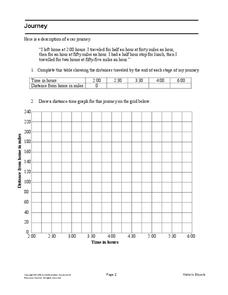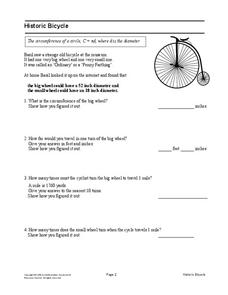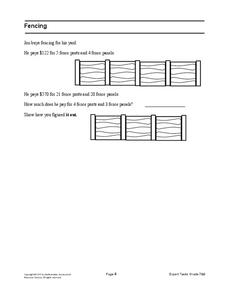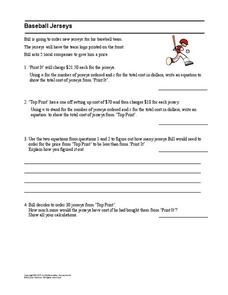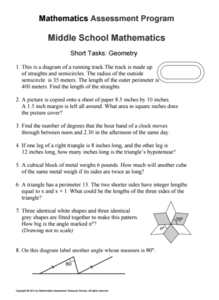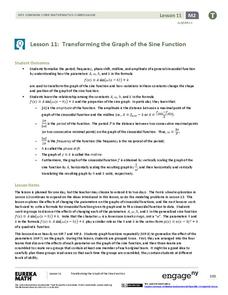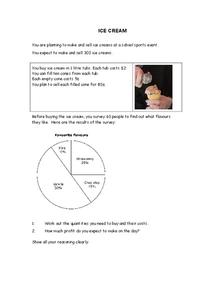Mathematics Assessment Project
Ratios and Proportional Relationships
Time to see what they've learned. Seventh graders solve a set of seven short problems in the ratios and proportional relationships domain. Applications include photo negatives, washing machines, coffee powder, sleep, stamps, etc.
Mathematics Assessment Project
Temperatures
As a middle school assessment task, learners first examine line graphs of monthly temperatures for two locations, and then match box plots to each line plot.
Mathematics Assessment Project
Shelves
Don't leave this task on the shelf — use it is assess middle schoolers understanding of patterns. Participants try to discover a pattern in the number of bricks and planks used to make shelves. They then match descriptions...
Mathematics Assessment Project
Octagon Tile
A connecting-the-dots activity seems too easy for seventh grade but connecting vertices may prove a challenge. Class members first examine a figure created by drawing squares around the inside of an octagon and connecting the...
Mathematics Assessment Project
Linear Graphs
A line is a line is a line. As a middle school assessment task, learners first identify graphs of given linear equations. They then identify the equations that represent real-world situations.
Mathematics Assessment Project
Journey
Drive home math concepts with an engaging task. Learners follow a verbal description to fill in a table and create a distance-time graph representing a car journey. They then answer questions by interpreting the graph.
Mathematics Assessment Project
Historic Bicycle
"Ordinary" bicycles are not so ordinary. Learners use given information to determine the circumference of wheels for a historic Ordinary or Penny Farthing bicycle. Pupils then determine the number of times each wheel turns when the...
Mathematics Assessment Project
Fencing
Nail this assessment task to your list of resources. Learners must set up equations to model the cost of fencing that includes posts and panels. They then determine the cost of a fence with a specific number of posts and panels.
Mathematics Assessment Project
Buying Chips and Candy
As a middle school assessment task, learners first two write equations representing their purchase of chips and candy bars. They then solve the system of equations to find the price of each item.
Curated OER
Buses
Busy buses bustling back and forth. For this middle school assessment task, learners use information given in a graph to answer questions about bus schedules. They then determine how many times a bus passes by other buses going in the...
Mathematics Assessment Project
Aaron's Designs
Learners first create designs for greeting cards by applying transformations of shapes on a coordinate plane, and then determine a sequence of transformations that produces a given design.
Mathematics Assessment Project
Bike Ride
As a middle school assessment task, learners interpret the graph of distance versus time for a bike ride. Pupils then determine distance of the trip, length of the trip, and speeds.
Mathematics Assessment Project
Baseball Jerseys
Batter up! As an assessment task, learners write linear functions to model the cost of baseball jerseys. They then determine which of two companies would charge a cheaper rate to buy baseball jerseys.
Mathematics Assessment Project
25% Sale
Free clothes? In the middle school assessment task, learners first consider whether four 25 percent reductions will result in a sale price of $0. Mathematicians then determine the sale price and discount percentage of such a sale.
Mathematics Assessment Project
Functions
Studying function means more than simply learning a formula. Learners must use functions to think through four problems and find solutions. Each task utilizes a different concept from a study of functions. Class members might...
Mathematics Assessment Project
Geometry
Help learners find joy in facing mathematical challenges. The questions posed on this worksheet encourage young mathematicians to utilize skills learned throughout a geometry unit, and to apply themselves and persevere through...
EngageNY
Margin of Error When Estimating a Population Proportion (part 2)
Error does not mean something went wrong! Learners complete a problem from beginning to end using concepts developed throughout the last five lessons. They begin with a set of data, determine a population proportion, analyze their result...
EngageNY
Transforming the Graph of the Sine Function
Build a solid understanding of trigonometric transformations through exploration. Learners work in teams to analyze the effects of different algebraic components on the graph of a sine function.
EngageNY
Graphing the Sine and Cosine Functions
Doing is more effective than watching. Learners use spaghetti to discover the relationship between the unit circle and the graph of the sine and cosine functions. As they measure lengths on the unit circle and transfer them to a...
EngageNY
Secant and the Co-Functions
Turn your class upside down as they explore the reciprocal functions. Scholars use the unit circle to develop the definition of the secant and cosecant functions. They analyze the domain, range, and end behavior of each function.
EngageNY
Why Call It Tangent?
Discover the relationship between tangent lines and the tangent function. Class members develop the idea of the tangent function using the unit circle. They create tables of values and explore the domain, range, and end behavior of...
Mathematics Assessment Project
Smoothie Box
Pupils demonstrate their understanding of nets by designing a net of a box that contains 12 bottles. Given the full size top and side views of the bottle, they determine the dimensions needed for the finished box. The directions do...
Mathematics Assessment Project
Ice Cream
I scream, you scream, we all determine the amount of ice cream! Pupils calculate the amount of ice cream flavors needed based on survey results in a short summative assessment. They determine the number of tubs and cost of ice...
West Contra Costa Unified School District
Polynomial Division
Multiply the ways your scholars can find the quotient with polynomial division. A lesson introduces polynomial division via long division, synthetic division, generic area model, and using the definition of division. Learners then...







